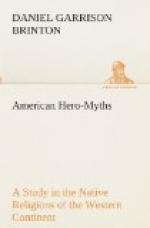It begins by connecting the creation of men and things with the appearance of light. In other words, as in so many mythologies, the history of the world is that of the day; each begins with a dawn. Thus the Popol Vuh reads:—
“This is how the heaven exists, how the Heart of Heaven exists, he, the god, whose name is Qabauil.”
“His word came in the darkness to the Lord, to Gucumatz, and it spoke with the Lord, with Gucumatz.”
“They spoke together; they consulted and planned; they understood; they united in words and plans.”
“As they consulted, the day appeared, the white light came forth, mankind was produced, while thus they held counsel about the growth of trees and vines, about life and mankind, in the darkness, in the night (the creation was brought about), by the Heart of Heaven, whose name is Hurakan."[1]
[Footnote 1: Popol Vuh, le Livre Sacre des Quiches, p. 9 (Paris, 1861).]
But the national culture-hero of the Kiches seems to have been Xbalanque, a name which has the literal meaning, “Little Tiger Deer,” and is a symbolical appellation referring to days in their calendar. Although many of his deeds are recounted in the Popol Vuh, that work does not furnish us his complete mythical history. From it and other sources we learn that he was one of the twins supposed to have been born of a virgin mother in Utatlan, the central province of the Kiches, to have been the guide and protector of their nation, and in its interest to have made a journey to the Underworld, in order to revenge himself on his powerful enemies, its rulers. He was successful, and having overcome them, he set free the Sun, which they had seized, and restored to life four hundred youths whom they had slain, and who, in fact, were the stars of heaven. On his return, he emerged from the bowels of the earth and the place of darkness, at a point far to the east of Utatlan, at some place located by the Kiches near Coban, in Vera Paz, and came again to his people, looking to be received with fitting honors. But like Viracocha, Quetzalcoatl, and others of these worthies, the story goes that they treated him with scant courtesy, and in anger at their ingratitude, he left them forever, in order to seek a nobler people.
I need not enter into a detailed discussion of this myth, many points in which are obscure, the less so as I have treated them at length in a monograph readily accessible to the reader who would push his inquiries further. Enough if I quote the conclusion to which I there arrive. It is as follows:—
“Suffice it to say that the hero-god, whose name is thus compounded of two signs in the calendar, who is one of twins born of a virgin, who performs many surprising feats of prowess on the earth, who descends into the world of darkness and sets free the sun, moon and stars to perform their daily and nightly journeys through the heavens, presents in these and other traits such numerous resemblances to the Divinity of Light, the Day-maker of the northern hunting tribes, reappearing in so many American legends, that I do not hesitate to identify the narrative of Xbalanque and his deeds as but another version of this wide-spread, this well-nigh universal myth."[1]




